Scans
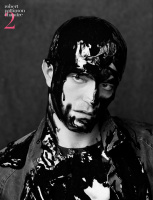
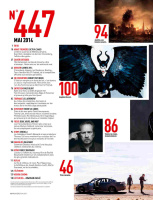
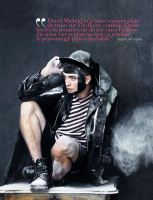


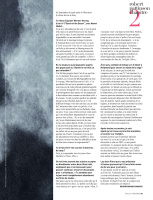
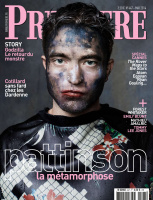

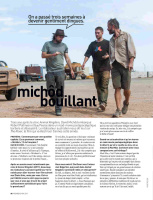


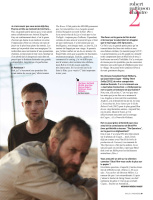

Untagged Pics
Outtakes
April 14th, 2014. It’s been fourteen minutes since Robert Pattinson disappeared into one of the rooms of this huge warehouse, transformed into a photo studio to get his make-up done. When he finally steps out, his face covered in black and white paint that will fade moments later when we finish throwing litres of water & Gatorade at his face. It is clear that the teenage idol from the Twilight saga has completely disappeared. He left in his place an actor that is more and more fascinating, an artist – He is the one who imagined the different staging of the session with the photographer Danielle Levitt – whose filmography is starting to seriously impress. Since the beginning of the year, he’s filmed with Werner Herzog (Queen of the Desert) & Anton Corbijn (Life), to which he’ll soon add Harmony Korine and James Gray (The Lost City of Z). After presenting Cosmopolis there in 2012, he is making his come back to Cannes with two films: Maps to the Stars, which marks his reunion with David Cronenberg, and The Rover, the new feature film of the Australian prodigy David Michôd (Animal Kingdom, 2011). A western of tetanized anticipation in which Pattinson, more baffling that ever, proves that the future belongs to him.
PREMIERE: We left you two years ago in the back of the limousine in Cosmopolis and we find you once again driving one in the new film by David Cronenberg, Maps to the Stars. Did he do it on purpose?
ROBERT PATTINSON: Maybe we’re building a trilogy around limousines… I don’t know if it was a conscious decision on his part or not.
PREMIERE: The recurring aspect is that in each film, you sleep with an accomplished actress…
ROBERT: That scene with Julianne Moore was so funny. And we had just met one another before we had to shoot it.
PREMIERE: It was also the case with Juliette Binoche when you filmed the sex scene in Cosmopolis. Is it your new way of welcoming actresses on set?
ROBERT: I remember seeing Juliette before we started shooting the scene. She was giving me advice: “Keep choosing classy projects and filming intelligent films.” And suddenly, David says “Action!” and we start fucking like beasts in the car. Very classy, that’s right… (Laughing). On top of that, it was boiling hot. I was sweating like crazy and huge drops of sweat were running down my forehead. I asked myself if I wasn’t having a heart attack. Every time a drop was falling, I was trying to stop it from ending up on Julianne’s back. It was ridiculous. After a while she turned back in my direction, worried and asked me: “Are you okay? Are you having a panic attack?” I was out of breath, completely drenched, meanwhile her, not at all.
PREMIERE: You don’t seem like the type of actor who only does half of the job.
ROBERT: Exactly. It’s my own sweat that you see on the screen. In The Rover, my problem was the flies. I had never seen anything like it. We were constantly covered in fake blood and once we came out, fifty flies started surrounding us. All day long, it wouldn’t stop.
PREMIERE: The glamorous side of the Australian outback.
ROBERT: We really shot the movie in the middle of nowhere. Most of the people you see in the movie were recruited on the same day, like this small guy who sells a gun to Guy Pearce and walks and grumbles: “Fuck, fuck, fuck!” He really was like that. There was also this guy with the with the crazy face we see in the shop. They found him while they were looking at the place. He came into the house thinking it was deserted and came face to face with this guy and his wife, who were naked – They found out later that she was naturist.
PREMIERE: One of the strength of the movie is its minimalism. Was it already that way on paper?
ROBERT: Yes, this impression of desolation was coming off the script, which had stricken me with its “hungry” side. The film is extremely bare but it manages to create an extra-terrestrial world of its own. A quality, which in a way, reminded me of Cosmopolis.
PREMIERE: This film clearly marked a turning point in your career. You told us once that it had “given you balls”. Are they still growing?
ROBERT: When you are in a blockbuster, you contribute to an ensemble without really knowing how. With the small films I do now – and it probably is because of their ambitious sides – I feeling like I’m creating something. It is way more palpable. David Michôd let me try a lot of different things in The Rover, like having rotten teeth or shaving the back of my head because I thought it made the character more vulnerable to have the nape of his neck exposed that way.
PREMIERE: The Rover seems like a new stage of your career. It is also how you feel?
ROBERT: The first time I ever felt like I was seeing an adult when I looked at myself on screen, was when I discovered the Dior ad that I filmed last year, directed by Romain Gavras. The Rover confirmed this feeling, which continued on Life, the film I just shot with Corbijn. I think I have more confidence in myself and these Cannes selections are helping a lot. After being dissed for years because of Twilight, my ego was a little bruised.
PREMIERE: Do you see this festival like an honour?
ROBERT: You have no idea… It’s a huge recognition. For a long time, I wanted roles without really knowing if I could play them. Today, I feel ready to take risks and assume these choices.
PREMIERE: Two years ago, you were telling us that you were desperately trying to contact Romain Gavras. You finally succeeded.
ROBERT: That ad for Dior was the only way I found to successfully contact him. I told myself: “Now, he’s finally going to reply to me.” I kind of feel like I bought that call… (Laughing)
PREMIERE: Where did the idea come from to make you look like a young Belmondo?
ROBERT: From Dior, even the original concept was much more sophisticated. We really changed things along the way. The way Romain works with his director of photography gives this extremely lively result. You have to know that we weren’t really allowed to shoot the part where I’m driving on the beach. Romain did this at 7 in the morning, and he wouldn’t stop screaming: “Hurry up, we’re losing the light!” What light? It’s 7am! The sand was wet, the car was getting stuck in it. So, I had to drive at 100 km/h with the two models in the back while Romain was screaming: “We’re losing the light! We’re losing the light!” I never thought I’d ever find myself in that kind of ad, but I have to admit that it was a really positive experience. Dior gave us a very incredulous amount of freedom.
PREMIERE: During our last interview, you were telling us that one of your dreams was to work with James Gray, which is happening soon. (Pattinson will soon have appear alongside Benedict Cumberbatch in ”The Lost City of Z”)
ROBERT: They moved the shoot back to January, again, and I’m kind of getting tired of waiting. It will take place in Colombia, it’ll be crazy. In the meantime, I might film something with Harmony Korine, with whom I’ve been dreaming to work since I was 17, like with James Gray. I keep asking him what the film is about but he doesn’t want to tell me.
PREMIERE: You just added Werner Herzog to your resume! (“Queen of the Desert”, with Naomi Watts!…) [L2TP THERE PREMIERE]
ROBERT: I wasn’t expecting that at all. It’s a very small role but I loved working with him. Whatever the subject it, he will always have an improbable story or an anecdote to tell. We were filming when the trial of Amanda Know (An American accused of killing one of her roommates in Italy) was re-opened and Herzog told us very seriously: “I saw documents that the public has never seen and I can guarantee you that she’s guilty.” (laughing). Evidently, I didn’t believe him at all.
PREMIERE: Are you still popular with paparazzi or has the hysteria died down?
ROBERT: I got better at not being seen. The last time I went back to London, I wasn’t photographed a single time. My best friend told me: “The next time you get your picture taken, remember this period of time when you were left alone. Don’t think of it as a prolongation of all the years you had your picture taken but as an isolated incident.” He is right. Before, I was sometimes going crazy when my picture was taken in the streets. It’s different when you’re a guy because beyond the intrusion of your private life, it’s also your masculinity that is ridiculed in a way. You end up face to face with guys that take pictures of you with no care in the world and you can’t do anything about it… There were moments where I literally wanted to kill them. I calmed down since then. Well, I think so, but it might only be because it’s rarer. What’s twisted in all this, is that my job is to get paid to play other people. How do you want the public to find this credible, if, every day, my face is in tabloids showing me grocery shopping?
PREMIERE: So you end up having your groceries delivered at home?
ROBERT: No, I order from Domino’s Pizza every day. (Laughing)
PREMIERE: We often see actors accept blockbusters in between independent films, explaining that it’s necessary in order to be able to be in more “artistic” projects. In your case, it’s like you’ve decided to abandon big studio movies…
ROBERT: Yes, because I don’t believe in this idea that you have to alternate between the two. The public doesn’t care if you do a “big” film or a “small” film. People just want to see you in a good film. Sometimes, some actors move from one big movie to another, until one day where everything stops at once. And in that moment, they end up helpless: “I don’t understand, I played the game.” Except there’s no rules. Everything can come crashing down at any time. The advantage if it happens to me is that I can always make some hundreds of dollars by going to sign autographs at Twilight conventions. (Laughing)
PREMIERE: How long do you think, will it take Hollywood to remake the saga?
ROBERT: I have no idea. I think the era of vampires is over, don’t you? It’s funny, a few days ago I was remembering filming a scene from Twilight with someone. I think it’s the first scene of the last movie, when Bella wakes up and sees Edward, a little like an apparition. We had been filming for a month in Canada in the freezing cold, I was this close to going depressed, and the only thing I found to feel better was going to take my breakfast at McDonald’s every morning. After four weeks of this, the moment came to film that scene and I was wearing a white shirt with light coming from behind me. When I watched the scene right after, I realized you could see the outline of my love handles freshly acquired. I recently saw the movie on TV and they are still there now.
PREMIERE: After all these year, I’m surprised to see there are still anecdotes to tell about Twilight…
ROBERT: When I think the first movie came out six years ago and that I got the role in 2007, it seems crazy to me. The major part of my twenties will have been focused on this. When the second movie came out, I understood it would take me at least ten years to be myself again and move on to something else.
PREMIERE: The two films that you’re going to present at Cannes prove that you will have needed less than ten years to achieve it…
ROBERT: I’m really excited at the idea of going back to the festival. I would love if all of my films were selected. For now, the last three films I shot since the end of Twilight have been. I will do everything I can to maintain this objective.
PREMIERE: We left you two years ago in the back of the limousine in Cosmopolis and we find you once again driving one in the new film by David Cronenberg, Maps to the Stars. Did he do it on purpose?
ROBERT PATTINSON: Maybe we’re building a trilogy around limousines… I don’t know if it was a conscious decision on his part or not.
PREMIERE: The recurring aspect is that in each film, you sleep with an accomplished actress…
ROBERT: That scene with Julianne Moore was so funny. And we had just met one another before we had to shoot it.
PREMIERE: It was also the case with Juliette Binoche when you filmed the sex scene in Cosmopolis. Is it your new way of welcoming actresses on set?
ROBERT: I remember seeing Juliette before we started shooting the scene. She was giving me advice: “Keep choosing classy projects and filming intelligent films.” And suddenly, David says “Action!” and we start fucking like beasts in the car. Very classy, that’s right… (Laughing). On top of that, it was boiling hot. I was sweating like crazy and huge drops of sweat were running down my forehead. I asked myself if I wasn’t having a heart attack. Every time a drop was falling, I was trying to stop it from ending up on Julianne’s back. It was ridiculous. After a while she turned back in my direction, worried and asked me: “Are you okay? Are you having a panic attack?” I was out of breath, completely drenched, meanwhile her, not at all.
PREMIERE: You don’t seem like the type of actor who only does half of the job.
ROBERT: Exactly. It’s my own sweat that you see on the screen. In The Rover, my problem was the flies. I had never seen anything like it. We were constantly covered in fake blood and once we came out, fifty flies started surrounding us. All day long, it wouldn’t stop.
PREMIERE: The glamorous side of the Australian outback.
ROBERT: We really shot the movie in the middle of nowhere. Most of the people you see in the movie were recruited on the same day, like this small guy who sells a gun to Guy Pearce and walks and grumbles: “Fuck, fuck, fuck!” He really was like that. There was also this guy with the with the crazy face we see in the shop. They found him while they were looking at the place. He came into the house thinking it was deserted and came face to face with this guy and his wife, who were naked – They found out later that she was naturist.
PREMIERE: One of the strength of the movie is its minimalism. Was it already that way on paper?
ROBERT: Yes, this impression of desolation was coming off the script, which had stricken me with its “hungry” side. The film is extremely bare but it manages to create an extra-terrestrial world of its own. A quality, which in a way, reminded me of Cosmopolis.
PREMIERE: This film clearly marked a turning point in your career. You told us once that it had “given you balls”. Are they still growing?
ROBERT: When you are in a blockbuster, you contribute to an ensemble without really knowing how. With the small films I do now – and it probably is because of their ambitious sides – I feeling like I’m creating something. It is way more palpable. David Michôd let me try a lot of different things in The Rover, like having rotten teeth or shaving the back of my head because I thought it made the character more vulnerable to have the nape of his neck exposed that way.
PREMIERE: The Rover seems like a new stage of your career. It is also how you feel?
ROBERT: The first time I ever felt like I was seeing an adult when I looked at myself on screen, was when I discovered the Dior ad that I filmed last year, directed by Romain Gavras. The Rover confirmed this feeling, which continued on Life, the film I just shot with Corbijn. I think I have more confidence in myself and these Cannes selections are helping a lot. After being dissed for years because of Twilight, my ego was a little bruised.
PREMIERE: Do you see this festival like an honour?
ROBERT: You have no idea… It’s a huge recognition. For a long time, I wanted roles without really knowing if I could play them. Today, I feel ready to take risks and assume these choices.
PREMIERE: Two years ago, you were telling us that you were desperately trying to contact Romain Gavras. You finally succeeded.
ROBERT: That ad for Dior was the only way I found to successfully contact him. I told myself: “Now, he’s finally going to reply to me.” I kind of feel like I bought that call… (Laughing)
PREMIERE: Where did the idea come from to make you look like a young Belmondo?
ROBERT: From Dior, even the original concept was much more sophisticated. We really changed things along the way. The way Romain works with his director of photography gives this extremely lively result. You have to know that we weren’t really allowed to shoot the part where I’m driving on the beach. Romain did this at 7 in the morning, and he wouldn’t stop screaming: “Hurry up, we’re losing the light!” What light? It’s 7am! The sand was wet, the car was getting stuck in it. So, I had to drive at 100 km/h with the two models in the back while Romain was screaming: “We’re losing the light! We’re losing the light!” I never thought I’d ever find myself in that kind of ad, but I have to admit that it was a really positive experience. Dior gave us a very incredulous amount of freedom.
PREMIERE: During our last interview, you were telling us that one of your dreams was to work with James Gray, which is happening soon. (Pattinson will soon have appear alongside Benedict Cumberbatch in ”The Lost City of Z”)
ROBERT: They moved the shoot back to January, again, and I’m kind of getting tired of waiting. It will take place in Colombia, it’ll be crazy. In the meantime, I might film something with Harmony Korine, with whom I’ve been dreaming to work since I was 17, like with James Gray. I keep asking him what the film is about but he doesn’t want to tell me.
PREMIERE: You just added Werner Herzog to your resume! (“Queen of the Desert”, with Naomi Watts!…) [L2TP THERE PREMIERE]
ROBERT: I wasn’t expecting that at all. It’s a very small role but I loved working with him. Whatever the subject it, he will always have an improbable story or an anecdote to tell. We were filming when the trial of Amanda Know (An American accused of killing one of her roommates in Italy) was re-opened and Herzog told us very seriously: “I saw documents that the public has never seen and I can guarantee you that she’s guilty.” (laughing). Evidently, I didn’t believe him at all.
PREMIERE: Are you still popular with paparazzi or has the hysteria died down?
ROBERT: I got better at not being seen. The last time I went back to London, I wasn’t photographed a single time. My best friend told me: “The next time you get your picture taken, remember this period of time when you were left alone. Don’t think of it as a prolongation of all the years you had your picture taken but as an isolated incident.” He is right. Before, I was sometimes going crazy when my picture was taken in the streets. It’s different when you’re a guy because beyond the intrusion of your private life, it’s also your masculinity that is ridiculed in a way. You end up face to face with guys that take pictures of you with no care in the world and you can’t do anything about it… There were moments where I literally wanted to kill them. I calmed down since then. Well, I think so, but it might only be because it’s rarer. What’s twisted in all this, is that my job is to get paid to play other people. How do you want the public to find this credible, if, every day, my face is in tabloids showing me grocery shopping?
PREMIERE: So you end up having your groceries delivered at home?
ROBERT: No, I order from Domino’s Pizza every day. (Laughing)
PREMIERE: We often see actors accept blockbusters in between independent films, explaining that it’s necessary in order to be able to be in more “artistic” projects. In your case, it’s like you’ve decided to abandon big studio movies…
ROBERT: Yes, because I don’t believe in this idea that you have to alternate between the two. The public doesn’t care if you do a “big” film or a “small” film. People just want to see you in a good film. Sometimes, some actors move from one big movie to another, until one day where everything stops at once. And in that moment, they end up helpless: “I don’t understand, I played the game.” Except there’s no rules. Everything can come crashing down at any time. The advantage if it happens to me is that I can always make some hundreds of dollars by going to sign autographs at Twilight conventions. (Laughing)
PREMIERE: How long do you think, will it take Hollywood to remake the saga?
ROBERT: I have no idea. I think the era of vampires is over, don’t you? It’s funny, a few days ago I was remembering filming a scene from Twilight with someone. I think it’s the first scene of the last movie, when Bella wakes up and sees Edward, a little like an apparition. We had been filming for a month in Canada in the freezing cold, I was this close to going depressed, and the only thing I found to feel better was going to take my breakfast at McDonald’s every morning. After four weeks of this, the moment came to film that scene and I was wearing a white shirt with light coming from behind me. When I watched the scene right after, I realized you could see the outline of my love handles freshly acquired. I recently saw the movie on TV and they are still there now.
PREMIERE: After all these year, I’m surprised to see there are still anecdotes to tell about Twilight…
ROBERT: When I think the first movie came out six years ago and that I got the role in 2007, it seems crazy to me. The major part of my twenties will have been focused on this. When the second movie came out, I understood it would take me at least ten years to be myself again and move on to something else.
PREMIERE: The two films that you’re going to present at Cannes prove that you will have needed less than ten years to achieve it…
ROBERT: I’m really excited at the idea of going back to the festival. I would love if all of my films were selected. For now, the last three films I shot since the end of Twilight have been. I will do everything I can to maintain this objective.
Three years after the shocking Animal Kingdom, David Michôd takes Robert Pattinson and Guy Pearce in a post-apocalyptic road-movie, barbaric and desperate.
PREMIERE: Let’s start with an important question. How do you pronounce “Michôd”? Like in French?
DAVID MICHÔD: Exactly. Ma family used to live in your country around a hundred years ago. I think that at the time, my name was written “Michaud”. It turned into “Michôd” with time, but it is still pronounced the same way.
PREMIERE: After such a success with Animal Kingdom (2011), a lot of directors would have left their native country to film something new in the United-States, but not you. Is it because of loyalty to your country or because you didn’t find a project satisfying enough to make the big jump?
DAVID: To be frank, the question isn’t really to know where you’re going to shoot, or even what to tell, but how to do it. I wanted to have total control of my second film and despite the incredible opportunities Hollywood was giving me, I quickly understood that I wouldn’t be able to control the whole process from A to Z. So I decided to work on my own script.
PREMIERE: You co-wrote The Rover with the actor Joel Edgerton, who worked in Animal Kingdom. How did the idea come to you?
DAVID: At first, Joel and I wanted to write a film for his brother Nash, who is a director. The starting point was simple. “Cars in the desert”. It was that simple. As Nash is also a stuntman, we thought it would be perfect for him. We wrote an idea of the story with Joel, then I isolated myself to write a first draft of the script. And very quickly, I realized I didn’t want to give this baby to Nash anymore!
PREMIERE: When you’re Australian and you shoot a post-apocalyptic road-movie in the desert, whether you want it or not, you’re measuring yourself to Mad Max. How did you compose this heritage?
DAVID: Mad Max is the star our cinema revolves around. It’s a film that surprised everyone, that showed we could accomplish exceptional things with a limited budget and that, despite being irrigated by a big love for the American cinema, showed its Australian identity in every scene. How do you measure up to that? The only solution was to not think about it. I know that The Rover is connected to different traditions – the road-movie, science-fiction, western – but I really wanted it to look new, unheard of.
PREMIERE: I think I heard you already had Guy Pearce in mind while you were writing the script….
DAVID: Yes, especially because I had loved our collaboration on Animal Kingdom. Guy is extremely talented; he is the kind of actor that gives his director the impression of being a virtuoso, playing on the most beautiful piano in the world. And the notes that we end up producing are magical! I was also looking for a man in his 40s, not too old and not too young. Someone who seems tough and dangerous but behind all that coldness, there is a big vulnerability. Guy does that perfectly.
PREMIERE: And Pattinson?
DAVID: I met Rob once before I even knew I was going to film The Rover. He is among the 400,000 people I met in Los Angeles when Animal Kingdom came out there. (Laughing) I knew nothing about him, I hadn’t seen the Twilight movie – Still haven’t seen them, by the way. However, some of my friends had told me he was an interesting guy. I was impressed by his intelligence, his energy, but that day, I was especially struck by his face. I thought I was going to come face to face with one of those young trendy guys whose beauty is dull but his mug is fascinating, totally atypical. Then, when we began casting for the film, I saw a lot of actors, some very well-known, but Rob’s tests were magnificent and very moving. And he really wanted to do the film, you could see it. It’s important for me.
PREMIERE: The Rover is one of those rough films, crushed by the sun for which we can imagine the whole shoot was really difficult.
DAVID: It was the case, largely because we were filming in isolated places and under searing heat. It could go up to 45°C. The big moment was when we installed our camp in a far-away place in the middle of nowhere, eight hours away, in the north of Adelaide. There was no network for the phones, no internet connection, a single phone line for the whole village. We spent three weeks there, slowly turning nicely crazy.
PREMIERE: We see once again, the great Scoot McNairy, who played in “Cogan” – “Killing Them Softly” (2012), by your fellow countryman Andrew Dominik. Is there really an “Australian Connection” in Hollywood or is just a journalistic fantasy?
DAVID: Non, no, it is real. It’s true that all the friends I am making in Los Angeles at the moment are Australian. Andrew, I was first a fan of him. I find ”The Assassination of Jesse James by the Coward Robert Ford” to be the one of the greatest films of the past twenty years. Today, we’re friends. As for Scoot, I met him while filming Cogan… In New-Orleans.
PREMIERE: Is it also thanks to Dominik that you met Brad Pitt (With whom Michôd will film “The Operators”, on the war in Afghanistan)?
DAVID: Yes and no. I crossed paths with Pitt very briefly on the set of “Cogan”… But I was in contact with Plan B (The production company of the actor) at the time. The Operators ended up appealing to him. I don’t know what to conclude from this, except that Brad might have a thing for Australian directors. (Laughing)
PREMIERE: Have you looked at the other films selected for Cannes? Which film attracts you the most on paper?
DAVID: Very good question, I should have thought about that before. (Silence). Oh yeah, I know. “Foxcatcher” (By Bennett Miller). Rumour has it that it is an extraordinary movie. And I loved Greig Fraser’s work. It’s him who enlightened the idea of “Cogan”. Another Australian….




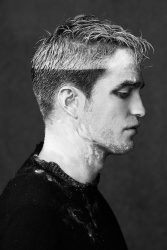

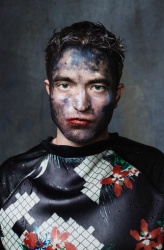
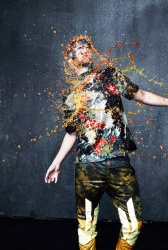
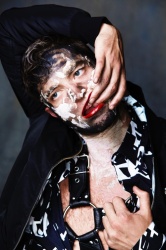
No comments:
Post a Comment